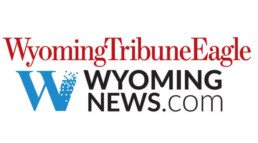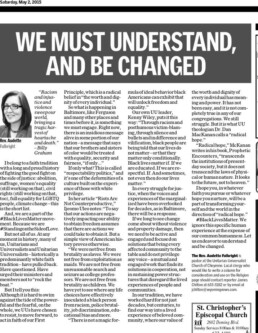Wyoming losing its religion

By JAMES CHILTON
May 13, 2015
Wyoming Tribune Eagle
CHEYENNE – Americans are losing their faith faster than ever before.
That is among the key conclusions of the new U.S. Religious Landscape Study released this week by the Pew Research Center in Washington, D.C.
Throughout 2014, Pew asked more than 35,000 Americans in all 50 states about their religious preferences. What it found is that the number of Christian adherents has been dropping for Catholicism, mainline Protestantism and, to a lesser degree, evangelical Protestantism.
Conversely, the percentage of Americans identifying themselves as unaffiliated with any religion has jumped, from 16.1 percent in 2007 to 22.8 percent in 2014.
The number of people in non-Christian faiths also has risen, albeit more slowly, from 4.7 percent in 2007 to 5.9 percent in 2014.
The Pew study found that younger Americans, particularly the millennial generation born after 1980, has been the biggest contributor to the rise in “nones,” or those who profess no specific religious faith.
“While many U.S. religious groups are aging, the unaffiliated are comparatively young – and getting younger, on average, over time,” the study concluded.
On a state-by-state basis, the rise in the irreligious has been most prevalent in the West, where many states, including Wyoming, report a higher proportion of unaffiliated than the U.S. average.
Specifically, about 26 percent of Wyomingites identify as unaffiliated. Of that 26 percent, only 3 percent identify as atheists, while another 3 percent identify as agnostic – a belief that it’s impossible to know whether a deity exists.
The remaining 20 percent simply state “nothing in particular” for their religious beliefs, though of that number, half of the respondents still said religion was “somewhat” or “very” important in their lives.
The trend may be cause for concern among local faith traditions, many of which are finding themselves confronted with the problem of how to attract millennials in new ways.
The Rev. Rodger McDaniel is the pastor at Highlands Presbyterian Church, a mainline Protestant denomination. He also is a past president of the Cheyenne Interfaith Council.
McDaniel said he has seen for himself how the younger generation, especially, is less inclined toward religion. But he said he doesn’t see it so much as a rejection of faith altogether, but rather a rejection of what he sees as the modern popular perception of Christianity.
“I hear from people who are offended by what they see as the face of Christianity, which is often times the talking heads on radio or television who espouse a very intolerant, exclusive view of Christianity,” McDaniel said. “I run into a lot of people who just can’t accept the idea there is only one way to have a relationship with God.”
He said that as some churches have taken a greater role in hot-button political issues like abortion or same-sex marriage, adherents who may disagree with their church on those issues are fleeing the pews.
“The faces they see are those who are intolerant, and people don’t want to be a part of that, and they tend to lump us all together,” McDaniel said.
Paul Flesher, a religious studies professor at the University of Wyoming, agrees with much of that assessment. He noted that many Western states are culturally libertarian, favoring a “live and let live” attitude toward their neighbors.
He said that when religions go against that attitude, it can turn people in those states off to religion.
“What I’m seeing happening is, on one hand, evangelical and the more right-wing strains of Christianity are gaining a lot of political power. But on the other hand, the public image of Christianity they are presenting as they do that is not attractive,” Flesher said. “In Wyoming, if we’re driving down the road in the middle of the winter, we’ll help someone who’s slipped off the road; it doesn’t matter what their religious or political beliefs are, as long as you stay off my land.”
He also noted that the number of nonreligious Americans claiming “nothing in particular” as their preference, compared to the much smaller number of avowed atheists and agnostics, suggests that for many, the question isn’t so much whether gods exist, but rather “who cares?”
“For a lot of people, religion just doesn’t matter; it’s not high on the list of things they think about,” Flesher said. “In Wyoming, I think that comes partially from individualism and partly from a certain amount of isolation, not defining your community around a religious organization.”
Father Carl Gallinger, the vicar general of the Roman Catholic Diocese of Cheyenne, said that while his diocese hasn’t been seeing any mass exodus of worshippers, he believes the church should be doing more to reach out to younger people especially. He believes that many millennials differ from older generations in that they weren’t raised in a faith and are thus less likely to consider the question.
“I’m not sure we’ve done the very best job of helping them become disciples of Jesus Christ in the Catholic tradition, and I also think societal and cultural influences have made it much easier for them to walk away from practicing their faith,” Gallinger said.
Gallinger said the election of Pope Francis, who has placed a renewed emphasis on helping the poor and the underprivileged, has helped to revitalize interest in Catholicism.
“I think people are encountering Pope Francis in a very positive way and are seeing him concerned about the least among us,” Gallinger said. “For many people, that’s very attractive, recognizing the call that Jesus gave us to be a service to the poor.”
But for many millennials, McDaniel said the issue isn’t so much one of faith as how that faith is interpreted and strengthened. He argued that many young people aren’t as comfortable with the traditional church service and are seeking other outlets.
“There are a lot of people in the millennial generation for whom 10 o’clock on a Sunday morning isn’t the ideal time for them to have one more day where they have to get everybody out the door by a certain hour,” McDaniel said.
Unitarian Universalist Church of Cheyenne Pastor Audette Fulbright said she has seen more adherents leaving or shunning traditional churches for a more holistic exploration of religion. She agreed with McDaniel that some people are simply getting tired of prescriptive dogma and would rather hold conversations than listen to sermons.
“Younger people, especially, are looking for authenticity in their experiences, period,” Fulbright said. “And the way we’ve classically done church in both the Catholic and Protestant traditions, there’s a ritual and a form that doesn’t always speak to the immediate needs of people’s lived experiences.”
Both Fulbright and Flesher noted that having children often can be a catalyst in bringing nonreligious people back into the religious fold.
“The most likely time is when they have children and want to find something that helps them to establish clear values,” Fulbright said. “They want their children not to be religiously illiterate.”


